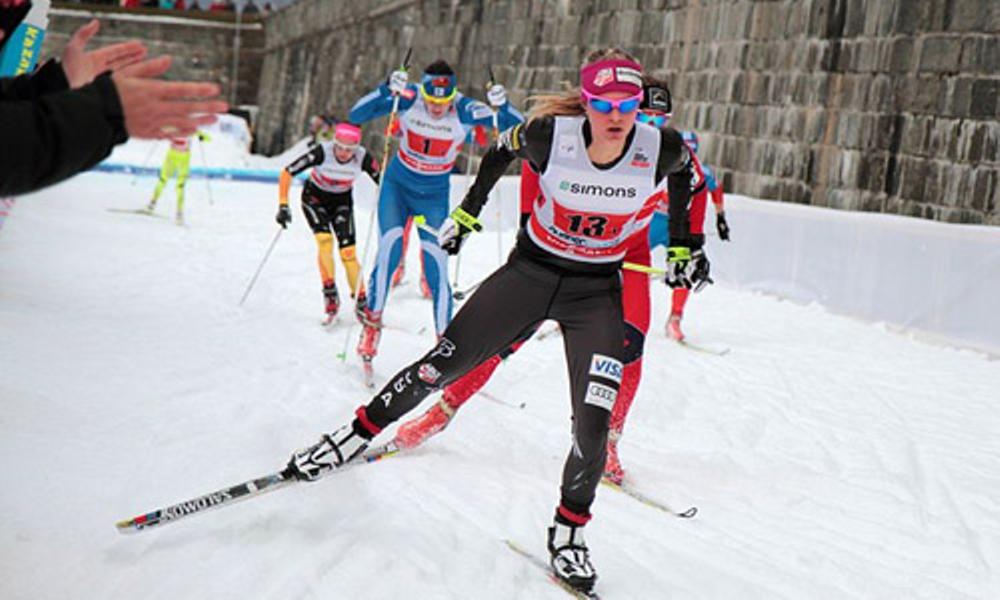
This post first appeared on norwiski.com and is reproduced with permission
As our favorite sport, cross country skiing requires not only the fittest of the fittest even on a recreational level but also an incredible amount of persistence and talent. You might not be surprised how great of exertion it is that our top cross-country skiing athletes perform at a professional level. Probably most of them won’t need an introduction, as you might be quite familiar with their names, but let’s have a look at some of the best female cross-country skiers and their stories that might inspire us all.
The 6 Most Inspiring Female Cross-Country Skiers
Jessie Diggins, USA
Jessica ‘Jessie’ Diggins (1991, age 29) is one of the young cross-country skier athletes who won (along with teammate Kikkan Randall) the very first gold in cross-country skiing for the United States during the Pyeongchang 2018 Winter Olympics. Jessie is also the first US cross-country skier who won four medals in cross-country skiing in the World Championship.
She is just as a team player as she is an independent and free spirit. She is known for being an adrenaline junkie, who’s after the peaceful quiet of snowy landscapes also appreciates the wild nature of sheer excitement when diving off planes or cliffs. Looking at the team sprint medals – they speak for themselves, however, Jessie never fails to acknowledge her team and everyone who supported her incredible performance even after her individual wins: they are thanks to all who stand behind her. Her humble and self-aware attitude aren’t empty words:
Jessie’s actions also demonstrate how she believes in how much a single person can achieve, but how much more when she is not alone! She joined the non-profit organization Fast and Female as an ambassador to inspire girls from as young as 8 years to choose a healthy and active lifestyle through sport. Jessie is also an ambassador for Protect Our Winters, another non-profit demonstrating how an individual could achieve something greater than him/herself if part of a community: after inspiring young girls through community and mentorship to become self-confident and independent women, this time she has nothing less than climate change in the crosshairs. Protect Our Winters (POW) aims to provide systemic solutions through the outdoor sports community to the challenges climates change makes us face.
Don’t be sorry for me because I just missed a medal…be happy WITH me, because I fought like a hell today! I pushed my body so far past it’s limits I’m actually kind of amazed I didn’t pass out on that final climb. Looking back and knowing you gave it absolutely everything you had without holding back is a great feeling. 30km of racing down…3 race days to go!
– says on Facebook, 15 February 2018
However, it is of a more personal nature for what we believe she should be on this list. As it was already known to some, but many only read about in her autobiography (Brave Enough), as a late teenager Jessie struggled with bulimia, an eating disorder known too-well by many cross-country skiers as well. It’s not the body only that is hurt, but the mind, the body image too. As is often the case, she developed an unhealthy amount of emotional baggage that is just won’t let you go. Also, being a skier from as early as age 3 she had become somewhat of a perfectionist which quality now made her condition even worse. Her incredibly honest testimony might be an example for many young women, as she shared her struggles as well as her triumphs when she eventually managed to get out of the grips of her condition. As the spokesperson for the Emily Program, she encourages young girls to don’t fear asking for help.
It takes a lot of bravery to ask for help and to decide to go to a recovery program and to decide to put your health first even when it’s not the quote easy choice
Despite her young age, she has come a long way from the BDD teenager to become a healthy and successful woman to whom we can all look up to. She races in Salomon skis and boots and uses Swix poles.
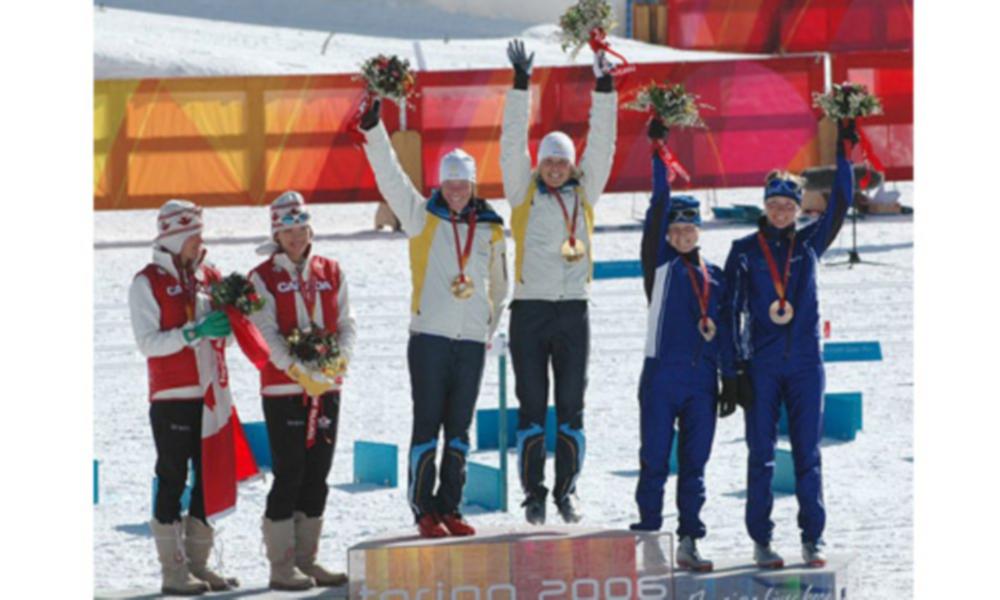
Beckie Scott, Canada
Let’s get on the snow right away with the Canadian Beckie Scott (1974, age 46), a three-time Olympian with one gold and silver medals won. She is Canada’s most decorated cross-country skier to date, and she was the first North American woman to win an Olympic medal in cross-country skiing, despite the fact that she had never won any noteworthy international events before.
Her Olympic career and glory had been shadowed by dopers. After initially arriving in the third place and receiving a bronze medal in freestyle leg at Salt Lake City 2002, it happened so that the original gold medallist was disqualified for drug use, which put Scott to the second place, silver. It wasn’t long that the new gold medallist was found to have used a performance-enhancing drug either, which finally elevated Scott to gold. Though fighting for the bronze in 2002, she received her rightful gold medal more than two years after the Olympics, in June 2004. Later, following disqualifications put her from the 6th place to the 4th in the 10km race.
These elevations might sound like something to be cheerful about, but unlike the parade one gets when receiving a gold medal right on the Olympic podium, she received her gold in a Vancouver art gallery years and many debates later. It isn’t a surprise that after one more silver in the team sprint at the Turin 2006 Olympics, she decided to retire from the sport. However, it wasn’t the last time cross-country skier fans have heard her voice.
Her negative experience with drug-using athletes had such a significant impact on her life, that she has been a loud advocate for a drug-free sport ever since, and joined the World Anti-Doping Agency’s athlete committee in 2005, right after her retirement from her athletic career. Later in 2012, she was appointed to WADA’s executive committee and received heavy pressure as she had been voicing concerns over WADA’s actions to reinstate the previously banned Russian anti-doping committee. For this reason, she resigned from the compliance and review committee in 2018. Later, her concerns proved right, as the data the Russian agency has promised in exchange seemed to have been tampered with.
Scott is most proud of having an athlete charter of rights approved into the WADA archives just on the last day of her term as chair.
As she formally stepped down as chair of the committee, she gave just the best speech during a news conference, once again being a proud voice of fairness and anti-doping.
My hope is that going forward, voices that challenge or dissent will be heard and taken into consideration rather than undermined or dismissed […] And my hope is that going forward, balance and independence will be restored to these tables, so that all interests and priorities here are aligned with equality of opportunity and fairness, rather than the business of sport.
Beckie Scott twice receiving the John Semmelink Memorial Award for “sportsmanship, conduct, and ability” should be noted not only for her athletic achievements but for being the flag-bearer and keen advocate of equality and fairness in sport whom we all need.
Though retired from competitive sport, Scott is still using Madshus skis and Salomon boots for recreation and to promote cross-country skiing for the younger generations.
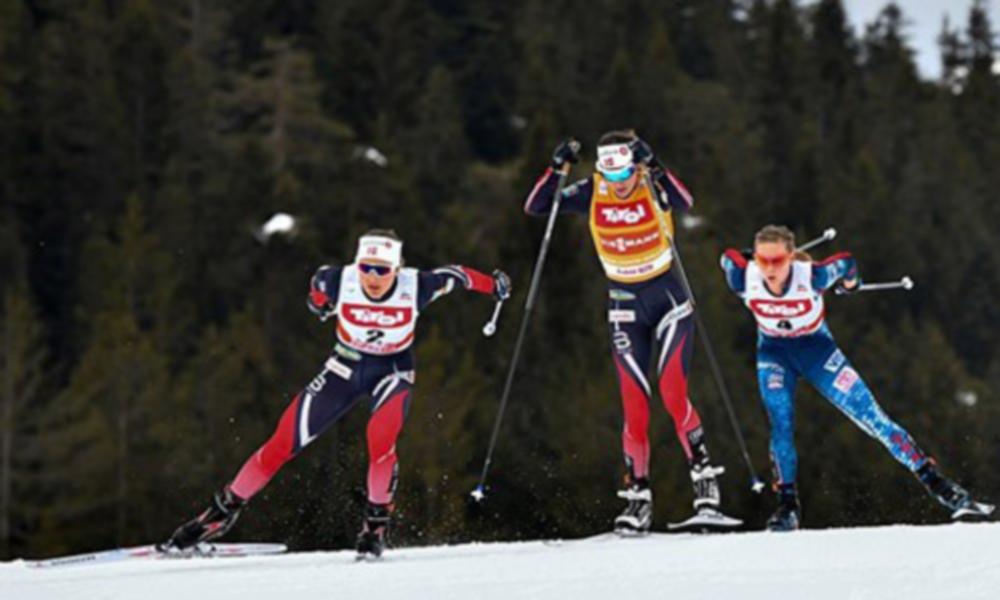
Ingvild Flugstad Østberg, Norway
Østberg (1990, age 29) is among the best female cross-country skiers of our time both in sprint and all-round. With 71 podiums and 17 victories at the World Cup to date, she was steadily in the best three between 2016 and 2019 and even ranked no. 1 in 2018/19. Østberg also won one silver and one gold medal at the 2014 Olympics and another gold at Pyeongchang 2018. Her success as one of the top XC skiers of the last few years became undisputed in 2019 with six more medals (1 gold, 3 silver, 2 bronze) rewarded at the World Championships.
Østberg is well-known for her cheerful attitude even after the toughest of races. Even after all her success, the young Norwegian cross-country skier seems to have been remained the same kind and polite woman, who wasn’t affected by no stardom. And though she fights when she has to – on the snow, Østberg really shows what cross-country skiing should stand for. Joy. Passion. Community. Hard-earned victories.
While her social media presence would tell otherwise, she is actively looking for ways to give back something to her fans and the community beside her positive mentality. She even took the effort to test, evaluate, and eventually redesign IDT’s rollerskis – who else does that? The Olympic champion actually took IDT’s original model, tested it, then totally reconstructed it to be actually great equipment equally for amateurs and professional sportsmen.
Despite her honest and cheery attitude, she still is a professional and as fierce on the tracks as she has to be. Even, when she isn’t finishing on top. Known for the rivalry with her teammate Heidi Weng, Østberg demonstrates what cross-country skiing is really about, and maintains a close friendship with her. She doesn’t feel the urge to be the funny and edgy star athlete as for instance Petter Northug, and we love her all the same.
It’s important for me to win fair in every aspect – I like to feel that I won because I’m the strongest, not because one of the competitors fell on the distance and the other had really bad skis
It is important for me to show that I am happy and that I love doing this. So, when I smile and cheer for teammates I can show that. When you smile more – it’s more likely the other person smiles back at you. Things get more positive.
– said to DailySkier
Ingvild Flugstad Oestberg uses Fischer’s SpeedMax 3D Skate Plus Stiff skis with SpeedMax Skate WS boots and WorldCup Skate IFP bindings.
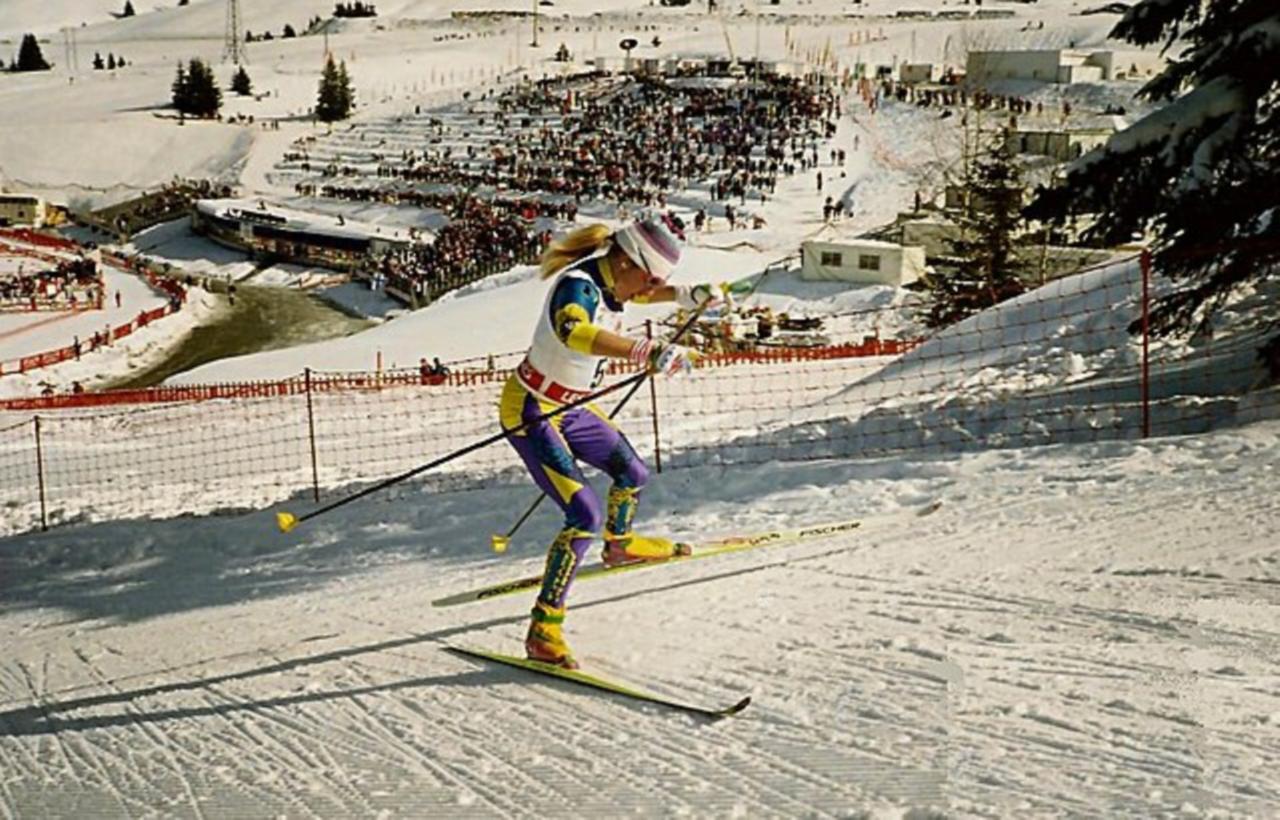
Stefania Belmondo, Italy
A real cross-country skier legend, the two-time Olympic champion and four-time world champion Stefania Belmondo (1969, age 51) was famous for her extreme training, having overall more than 10,000 km covered each year on skis! The “Tiny Tornado” as they called her due to her 5 ft 2 in (158 cm) height brought her first medals on her second Olympics in Albertville 1992, one gold, one silver, and a bronze right off. However, following the successful FIS World Cup 1993 where she finished with two golds (5 km + 10 km combined and 30 km) and a silver (4×5 km relay), Belmondo got an injury requiring not only surgery but months of absence from training and competition.
The Tiny Tornado couldn’t keep resting while months or even years go by. After one more operation, she decided to race in the Lillehammer 1994 Olympics, where her performance was disappointing, rewarded only by two bronze medals. Despite her injury, her failure to meet the standards she previously set for herself, and even against the advice of her physician, she was determined. So she decided to keep going, and continued her athletic career with one of her best seasons in the 1996-97 World Championships in Trondheim. She won three silver medals, all of which were behind her Russian rival Yelena Välbe. In the 15 km pursuit event, they were so close that the jury had to use a photo finish for determining the winner. It was 0,8 in (2 cm) for Välbe.
It wasn’t the last time when her determination and persistence pushed her body to its limits and produced something of an incredible performance. In the Nagano 1998 Olympics she again over-performed against all odds: beside her individual silver in 30 km, she raced to bronze in the 4×5 km relay though her Italian team was ninth before Belmondo started the last leg! After two more gold medals in the FIS Championships in 1999, Belmondo started out her last but one of her best competitive season at the Salt Lake City 2002 Olympics to prove that she deserves to be counted among the skier legends.
It was in the 15 km event when with 4,5 km to go her right pole broke. She was hindered so that she slipped down from the 1st place to the 10th. She could have given up, but rescue shortly arrived, a French official offered one of his own poles. The pole wasn’t perfect, and she couldn’t have caught up with that mismatched pair. Finally, her coach arrived with a new pole, and the Tiny Tornado managed to come out a winner again.
Today I’m very, very happy. It’s simply incredible,” said after her freestyle victory “I broke my pole at the 10.5km mark and lost around five or six seconds. A French guy ran up and handed me a pole, but it was too short. Eventually my coach got a pole to me and when I caught up with the group I knew I could catch up.
What we should learn from Belmondo is that she never lost hope that she can make it against all odds. Though she never won the World Cup, she finished steadily silver on four occasions. And Belmondo, the Tiny Tornado doesn’t strike me as someone who couldn’t get over that easily. She retired as the second woman in history to win 10 medals at the Winter Olympics, tied with Marit Bjørgen and Raisa Smetanina. And after all, four years and a retirement later she was the one who lit the Olympic Flame at the opening ceremony of Turin 2006 Winter Olympics.
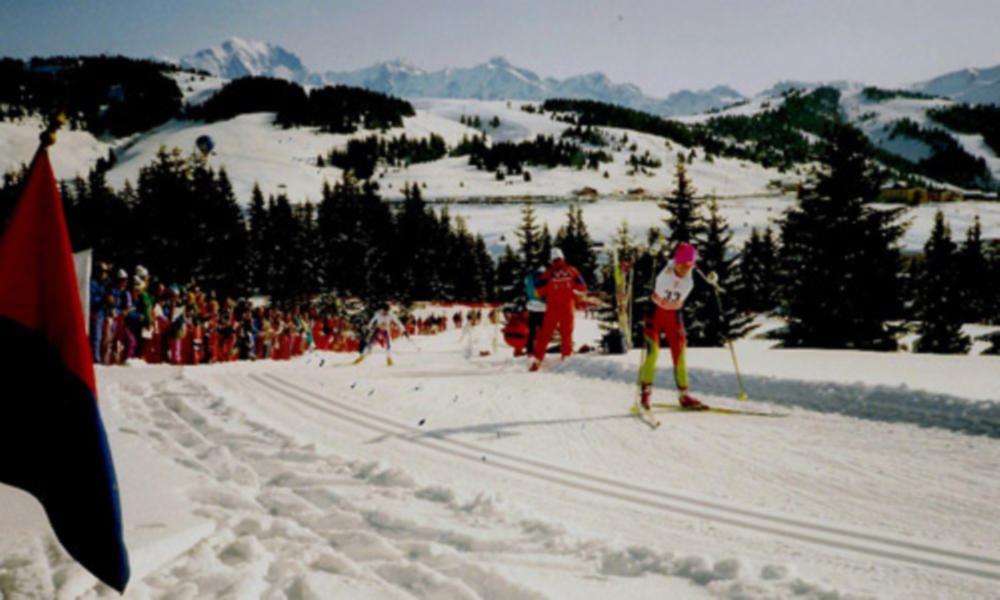
Yelena Välbe, Russia
Now let’s have a look at the legendary Russian cross-country skier who got between Belmondo and the World Cup no less than three times. Yelena Välbe (1968, age 52) was no cake back on the tracks and is no cake today as head of the Russian Cross Country Ski Federation.
Undisputedly, Välbe was one of the best cross-country skiers of the 90s. She was in the top three for the World Cup in nine consecutive years, as well as she literally won almost every race during these 10 years, except for individual Olympic gold. Her legendary best year was 1997 when Välbe triumphed in all five events during the World Championships.
The rivalry between Välbe and Belmondo was no coincidence, as neither of these two women has ever known compromise. They closed in on each other year after year and it was as wonderful to watch as it was nerve-racking. Competitive sport was demanding on her body too. She often fell to illness and she had some events that she just had to miss due to her condition. She had to manage to keep pace with the sport, her health as well as her family – she had a son, Franz from Estonian cross-country skier Urmas Välbe. It was surprising news at the time, but it could have been expected: she retired from competitive sport almost immediately after the 1999 World Championships.
Välbe kept on balancing the different parts of her life just as you put your body weight from one side to the other on the skis. After her retirement, she soon became involved with the support and development of children’s sports, as well as became a figure for the fight against doping in sports and the promotion of a healthy lifestyle. After receiving mixed responses as being the vice-president of the Russian Cross-Country Ski Federation, she resigned, and only years later that she came back just as boldly.
Now, back as president of the Russian Cross-Country Ski Federation and member of FIS Cross-Country Ski Executive Board Välbe is still known for her fiery and brutally honest remarks. Just as she never tolerated doping or even idleness in her Russian teams, she also kept on fighting when she had to protect her athletes against injustice. Time often proved her right, as in many cases charges were dropped and most athletes (e.g. Alexander Legkov) were cleared of all charges.
Välbe should be noted for being the fierce and critical fighter she is in every aspect of her life, let it be about skiing, family, or her hard stand against drug use in sport. To put it bluntly: Sometimes you just have to say what others need to hear, while sometimes you just have to be tough and be like Yelena:
People tend to take my remarks very sensitively, even panicking. There was a case when I told a skier: ‘Tomorrow everything is in your legs’ – and he, as it turns out, could not fall asleep all night because of that. One simply should not be in elite sport with such a fragile mental state
One can only admire or disdain her sincereness.
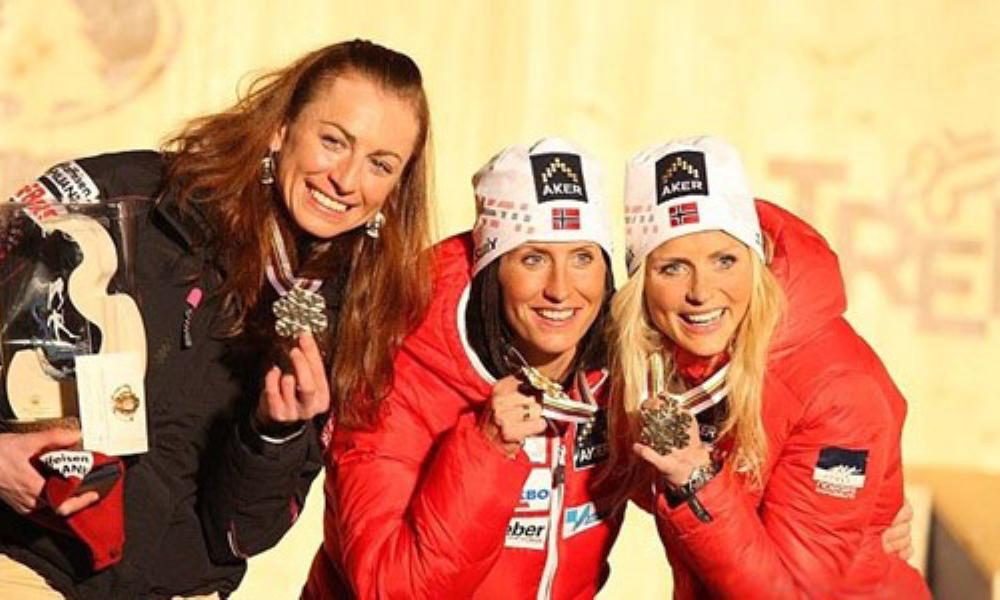
Marit Bjørgen, Norway
Marit Bjørgen (1980, age 40) is unquestionably the most successful female cross-country skier of all time. With 114 individual victories, she is all-time first in World Cup rankings. She is also the best sprinter in Cross-Country Ski history having 29 victories. At the Vancouver 2010 Olympics, she received the most medals with a total of five (3 gold). After a similar success at the Pyeongchang 2018 Winter Games, the now five-time Olympian Bjørgen has collected a record number of 15 Olympic medals, thus having the most Olympic medals won by any athlete in Winter Olympics history.
As someone as successful in her field as she is, it would be tempting to just shut the doors behind her, and let her secret be as it is, but Bjørgen is no ordinary athlete. She agreed to an extremely long and extensive experiment and research on her training regime that lasted no less than 17 years between 2000 and 2017. During this period Bjørgen’s training data was continuously monitored and analyzed, but she was eager to be part of something that could help future athletes to create the most effective training program.
But efficiency isn’t everything. Many cross-country skiers are often too late to realize this when they are already as skinny as their skis are. Bjørgen was always keen on creating a balance between training, performance, and healthy body weight. Skiers too frequently try to compensate for a lack of speed by losing weight. However, as Bjørgen’s clear as day results demonstrate they couldn’t be more wrong. Moreover, a healthy weight and body image could bring more results in the long run. During her 19 years long career she has always maintained her weight at around 65 kg.
Bjørgen’s example and the actual data the researchers received have shown that top-level performance and a healthy lifestyle aren’t necessarily incompatible. It really is demanding, as most of her training sessions were more than an hour-long, varying between low, moderate, and high intensity.
As queen of cross-country skiing, Bjørgen was and still is an icon and inspiring role-model for many who by now had become successful cross-country skier athletes as well. After decades of success and dozens of medals, she decided to retire from competitive skiing in 2018, allowing a new generation to dominate the tracks.
Well before her first Olympic gold, let’s hear Marit Bjørgen’s motivating words:
This silver is gold for me. I was really nervous before the start today because I’d been sick and didn’t know how good I could be.
Now jump back to the present, and look at all that she has achieved. This might be true for each of these great athletes, and if you just don’t feel to get on your skis, or you have a bad day, just think of these champions and how they have done it. You might want to think, you can go that way too.
I think Charlotte Kalla of Sweden should be on this list!!